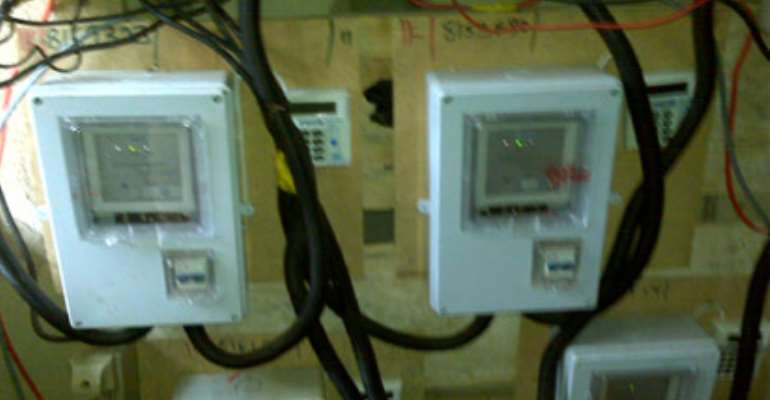ELECTRICITY: THE NEW TARIFF WAR

Oscarline Onwuemenyi
Efforts by the Federal Government and its officials to sell the proposed tariff increase in the power sector (effective from June 1), appears not to be going as smoothly as they would desire. The mere mention of tariff hike in the highly charged socio-political atmosphere is in itself, an invitation to controversy and pig-headed confrontation. And for good reason, too, one could argue.
The persistent question on the lips of many Nigerians
Prepaid meters
has been: where is the power, even after the billions of dollars poured into the sector over the past 10 years?
This attitude defines the relationship between Nigerians and power sector administrators, including the Nigeria Electricity Regulatory Commission, NERC, whose unenviable job it is to stuff the bitter pill of the new electricity tariff hike down the larynx of long-suffering Nigerians.
Indeed, NERC has at several fora feverishly sought to explain that the new tariff structure would enthrone efficiency and good governance in the Nigerian Electricity Supply Industry (NESI) that has been absent since the introduction of electric power in the country. Meanwhile, the organization has said it is not leaving any stone unturned in its quest to creditably implement the new electricity tariff structure.
Opposition mounts
But the opposition mounts nonetheless. First off the block, and unsurprisingly, is the electricity workers themselves who roundly rejected the proposed tariff increase. The workers, who ironically should bear the brunt of the blame for the nation's epileptic power supply over the years, queried the rationale for such an increase at a time when power supply is at its lowest ebb.
The President, Senior Staff Association of Electricity and Allied Companies (SSAEAC), Mr. Bede Opara, wondered why the government would insist on increasing tariff for 'electricity we hardly see,' even as he reiterated the need for adequate supply of electricity before increasing the tariff.
On his own part, President-General of the Trade Union Congress (TUC), Mr. Peter Esele, said Nigerians cannot pay the proposed electricity tariff increase.
The TUC leader, who spoke in Abuja at a meeting with the Minister of Power, Prof. Bath Nnaji, Minister of Labour Chief Emeka Wogu, and the Chairman, Nigeria Electricity Regulatory Commission (NERC), Dr. Sam Amadi, said the increase is illegal.
According to Esele, 'One of the issues has to do with the political leadership; sometimes they put the cart before the horse. NERC says it wants to make metres available for everyone in 18 months so that we start paying for what we consume. My question is if right now I am not paying for what I consume, are you saying I will continue to pay illegally for 18 months before the metres are available?'
However, Amadi, at a recent stakeholder's roundtable on power sector reform in Abuja, pointed out that Nigerians who oppose the new tariff hike do not understand its actual intent for the power sector.
According to him, 'Let there be a new conversation on this tariff because I want Nigerians to understand that this is not like the fuel price increase, but a well calibrated price. I appeal to Nigerians to understand that because overall, this tariff is cost efficient and we need the support of Nigerians to fight the corruption in the sector for efficiency.
'The reason why the sector has collapsed is due to lack of good governance, promotion of self interest amongst policy makers and the truth is that the sector will collapse further if we don't get this tariff right, even if we get it right and do nothing more, it will still collapse.'
He stressed that NERC would continue its advocacy for the adoption of the new electricity pricing regime contained in its Multi Year Tariff Order 2 (MYTO-2).
Amadi further cautioned civil society organisations in the country against opposing the new tariff, adding that the price increase was just a component of the whole reform in the power sector and should not be treated as an end in itself.
He said, 'We want to consult with the civil societies, talk to them and get their feedback because we recognise that the price review is one small segment or component of the whole reform and from day one of this, we have said that everybody should be part of the whole process, unfortunately, we have an organised industry stakeholder but not an organised consumer stakeholder, and in each of the consumer assembly we have gone to, I have always emphasised that civil societies should organise themselves alongside a voice because policy making is all about voice.
